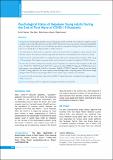Please use this identifier to cite or link to this item:
https://hdl.handle.net/20.500.14356/1032Full metadata record
| DC Field | Value | Language |
|---|---|---|
| dc.contributor.author | Sharma, Shristi | - |
| dc.contributor.author | Qian, Wu | - |
| dc.contributor.author | Acharya, Bipin Kumar | - |
| dc.contributor.author | Kunwar, Dipak | - |
| dc.date.accessioned | 2023-04-20T07:13:38Z | - |
| dc.date.available | 2023-04-20T07:13:38Z | - |
| dc.date.issued | 2022 | - |
| dc.identifier.citation | SharmaS., QianW., AcharyaB. K., & KunwarD. (2022). Psychological Status of Nepalese Young Adults During The End of First Wave of COVID-19 Pandemic. Journal of Nepal Health Research Council, 20(01), 166-172. https://doi.org/10.33314/jnhrc.v20i01.3922 | en_US |
| dc.identifier.issn | Print ISSN: 1727-5482; Online ISSN: 1999-6217 | - |
| dc.identifier.uri | http://103.69.126.140:8080/handle/20.500.14356/1032 | - |
| dc.description | Original Article | en_US |
| dc.description.abstract | Abstract Background: Psychological problems increased during the period of COVID-19. Lockdown” is adopted in many countries of the world. It has also been seen that COVID-19 has led not only to an increase of infection and death but also vast change in the lifestyles of every individual especially in young adults causing various mental health issues. However, in Nepal, there are limited studies to address this issue. The main objective of this study is to generate evidence on the prevalence of symptoms of post-traumatic stress disorder, anxiety, and depression among young adults and the factors contributing to these outcomes in Nepal. Methods: Cross-sectional methods were employed using an online structured questionnaire in January 2021, among 1229 participants. Three logistic regression models were performed to examine the significant COVID-19 factors. Results: The prevalence of Depression, Anxiety and post-traumatic stress disorder related symptoms in this study were 255(20.4%), 240(19.2%)and 162(13.2%) respectively relate.COVID-19 diagnosis, COVID-related stress and exposure was significantly related to depression. Similarly, COVID-19 diagnosis, change in income during COVID-19, being exposed to 4 or more exposure factors had high chances of getting anxiety. Also, income change during COVID-19 and stressors during COVID-19 were related to post-traumatic stress disorder. Conclusions: This research shows that various COVID-19 related factors have contributed to the high prevalence of these outcomes. Keywords: Anxiety; COVID-19; depression; Nepal; post-traumatic stress disorder. | en_US |
| dc.language.iso | en | en_US |
| dc.publisher | Nepal Health Research Council | en_US |
| dc.relation.ispartofseries | Jan-March, 2022;3922 | - |
| dc.subject | Anxiety | en_US |
| dc.subject | COVID-19 | en_US |
| dc.subject | depression | en_US |
| dc.subject | Nepal | en_US |
| dc.subject | post-traumatic stress disorder | en_US |
| dc.title | Psychological Status of Nepalese Young Adults During The End of First Wave of COVID-19 Pandemic | en_US |
| dc.type | Journal Article | en_US |
| local.journal.category | Original Article | - |
| Appears in Collections: | Vol. 20 No. 01 (2022): Issue 54 Jan-March, 2022 | |
Files in This Item:
| File | Description | Size | Format | |
|---|---|---|---|---|
| 3922-Manuscript-28199-1-10-20220621.pdf | Fulltext Download | 262.93 kB | Adobe PDF |  View/Open |
Items in DSpace are protected by copyright, with all rights reserved, unless otherwise indicated.
